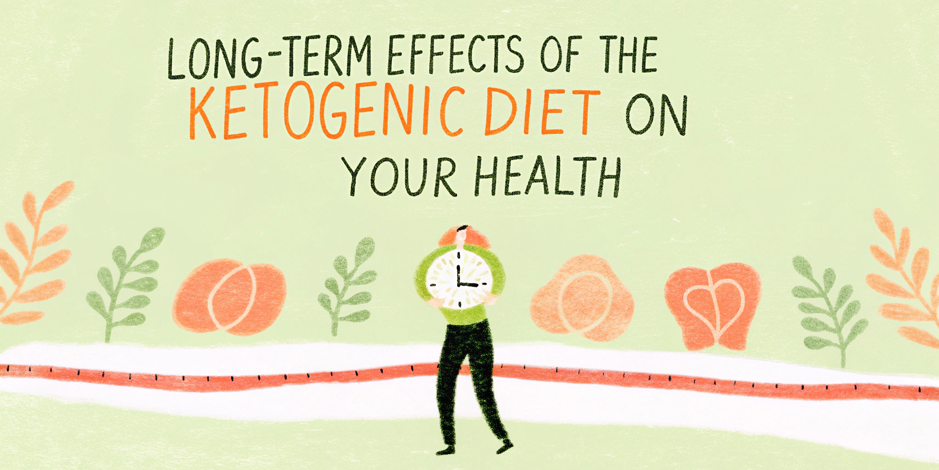The ketogenic diet (keto) has become one of the most researched and widely adopted dietary approaches due to its ability to promote weight loss, enhance metabolic health, and improve brain function. While some diet trends fade, keto has remained popular because of its scientifically supported long-term benefits. This article explores the current research on how a well-balanced ketogenic diet can impact overall health over time.

What is the Ketogenic Diet?
The keto diet is a high-fat, low-carb, moderate-protein diet that shifts the body’s metabolism from glucose-burning to fat-burning. This process, called ketosis, allows the body to produce ketones, an alternative fuel source derived from fat.
How Ketosis Works
- Lower carb intake depletes glycogen stores, forcing the body to burn fat for energy.
- The liver produces ketones, providing a steady energy source for the brain and muscles.
- Blood sugar and insulin levels stabilize, reducing inflammation and promoting metabolic efficiency.
Originally developed for epilepsy management, the keto diet has since gained recognition for its broad health benefits, from weight loss to cognitive performance.
Long-Term Health Benefits of the Ketogenic Diet
1. Sustainable Weight Loss and Fat Burning
One of the most significant long-term advantages of keto is its effectiveness for weight loss and fat-burning, particularly around the abdomen.

Research highlights that:
- Keto leads to greater fat loss compared to traditional low-fat diets (PMC).
- It reduces cravings by regulating hunger hormones like ghrelin.
- The metabolic effects of ketosis help maintain weight loss over time.
Unlike many other diets, keto enables sustainable fat loss without muscle depletion, making it a powerful tool for long-term weight management.
2. Improved Brain Function and Cognitive Longevity

Research suggests that a long-term ketogenic diet can:
- Enhance memory and focus by reducing oxidative stress in the brain.
- Lower the risk of neurodegenerative diseases such as Alzheimer’s and Parkinson’s (Nature).
- Support mental clarity and mood stability by regulating neurotransmitter function.
Many individuals following keto report increased productivity, sharper concentration, and reduced brain fog, making it an excellent choice for cognitive health.
3. Cardiovascular Health and Heart Function
Keto has been found to positively impact heart health markers, making it beneficial for long-term cardiovascular wellness.
Heart-Healthy Benefits of Keto:
- Increases HDL (good cholesterol) while lowering triglycerides.
- Reduces inflammation and stabilizes blood sugar levels.
- Supports arterial health by reducing oxidative stress.
By prioritizing healthy fats like olive oil, nuts, avocados, and fatty fish, individuals can maximize the heart-protective effects of keto.
Maximizing the Long-Term Success of Keto

1. Ensuring Optimal Nutrition
A well-balanced keto diet includes a variety of nutrient-dense, whole foods to ensure proper vitamin and mineral intake.
Key Nutrient Sources on Keto:
- Leafy greens and cruciferous vegetables for fiber and antioxidants.
- Electrolytes from avocados, nuts, and seeds to prevent imbalances.
- Omega-3 fatty acids from salmon and chia seeds for brain and heart health.
2. Hydration and Kidney Support
Maintaining proper hydration is essential for long-term keto success. Research suggests that adequate water intake:
- Supports kidney function and prevents dehydration (Harvard Nutrition Source).
- Aids in flushing out toxins and minimizing the risk of kidney stones.
- Ensures smooth digestion and electrolyte balance.
3. Promoting Longevity and Anti-Aging
Keto has been linked to reduced oxidative stress and inflammation, both of which play a role in aging. Incorporating the following anti-aging keto foods can enhance longevity:
- Dark leafy greens to fight free radicals.
- Berries (in moderation) for essential antioxidants.
- Healthy fats like olive oil and nuts to support cellular function.
Risks and Considerations
While the ketogenic diet offers many benefits, there are some considerations to keep in mind for long-term success and overall well-being.
1. Potential Nutrient Deficiencies
Since keto limits certain food groups, there is a possibility of deficiencies in fiber, vitamin C, magnesium, and potassium. To avoid this, individuals should consume a variety of low-carb vegetables, nuts, and seeds and consider supplementation if needed.
2. Possible Effects on Cholesterol
Although keto improves many heart health markers, some individuals may experience elevated LDL cholesterol. This is why it’s important to focus on healthy fats like olive oil, avocados, and fatty fish instead of processed or trans fats.
3. Adapting Keto for Long-Term Sustainability
Strict keto adherence may be challenging for some individuals. Cyclical keto (adding occasional healthy carb days) or transitioning to a low-carb Mediterranean approach can provide more flexibility while maintaining many of the benefits.
4. Consulting with Healthcare Professionals
Before starting or maintaining a long-term ketogenic diet, individuals with pre-existing health conditions, such as diabetes, cardiovascular disease, or kidney concerns, should seek guidance from a healthcare provider or registered dietitian to tailor the diet to their needs.
Is the Ketogenic Diet a Sustainable Lifestyle?
Many individuals successfully follow keto for years while experiencing consistent energy, weight stability, and improved metabolic markers. Some variations, like cyclical keto or modified low-carb diets, provide flexibility for those seeking long-term balance.
Key Takeaways for Lifelong Keto Success:
- Focus on whole, nutrient-dense foods for optimal nutrition.
- Stay hydrated and ensure proper electrolyte intake.
- Adjust carb intake as needed to maintain metabolic flexibility.
- Incorporate variety to keep keto sustainable and enjoyable.
Final Thoughts
The long-term benefits of the ketogenic diet are backed by scientific research, demonstrating its effectiveness for weight loss, cognitive health, and metabolic stability. When approached with nutritional balance, hydration, and professional guidance, keto can be a sustainable, health-enhancing lifestyle.
For best results, consult with a nutritionist or healthcare professional to tailor keto to your personal health goals and needs.
References
- PMC – “Long-Term Effects of the Ketogenic Diet on Metabolic Health” Read more
- Nature – “Ketogenic Diet’s Impact on Neurological Disorders” Read more
- Harvard Nutrition Source – “Effects of the Ketogenic Diet on Heart and Kidney Health” Read more
- University of Chicago Medicine – “Risks and Benefits of the Ketogenic Diet” Read more
- UT Health San Antonio – “Long-Term Keto Diet and Aging Effects on Cells” Read more

 Animal-Based Foods
Animal-Based Foods 


 Fruits & Vegetables
Fruits & Vegetables 


 Nuts, Seeds & Grains
Nuts, Seeds & Grains 


 Beverages
Beverages 

 Oils, Sauces & Condiments
Oils, Sauces & Condiments 



 Packaged & Processed Foods
Packaged & Processed Foods 




